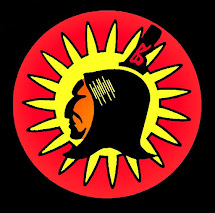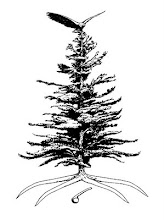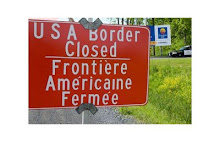Thursday, October 31, 2013
Two Row Time
Previously published in the October 30, 2013 issue of The Two Row Times
Much has been made of the Two Row Wampum lately. The “Two Row Wampum Renewal Campaign” and the launch of the “Two Row Times” are just two examples of the recent attention being given to it. Yet there seems to be something fundamentally missing from a meaningful conversation on the subject even as attention has spread.
Let’s be clear. The Two Row isn’t just about a ship and a canoe. It is about the paths of creation. This is important enough to repeat — the two rows symbolized in the Kaswentha are paths. They are not roads, highways, canals, pipelines, power lines, lines on a map, or a charted course on a body of water. A path yields to nature whether it is laid down by the feet of millions of our ancestors, a pair of chipmunks, or mighty glaciers. It widens, it narrows, it adjusts with time, and it provides the guidance for us in times of trouble or conflict.
The message of the Kaswentha is respect, rights and responsibility. Respect of the paths for all of creation is what we remind ourselves of every time we say the Ohenton Karihwatehkwen — those words before all else. We respect not only those paths and our relationships to them but also the rights and responsibilities of those who travel those paths.
Our path, too, needs respect. Respecting that path shows not only respect to those who came before us but also a commitment to those who will follow us.
But this is the tough part. While we are quick to claim the rights we hold, we are not so prepared to uphold the responsibilities that come with them. And if we jump off our path or if one of those shiny objects from their vessel catches our eye, do we accept the responsibility for that pursuit?
We need to take a hard look at three specific examples of these shiny objects and how each one has affected us. Many seem to be oblivious to how far off our path they have strayed; yet, we all have been impacted.
Voting is one of those shiny objects dangled in front of us and promoted on both sides of the imaginary line. Voting in non-Native elections is so clear an act of the assimilated that it is amazing to me it is even tolerated among our people; yet, in many places “tribal government” is so complicit that they actually assist in “Get out the Vote” campaigns for the non-Native elections. In my opinion, voting is a cop-out if not a sellout. It is simply passing the buck for responsibility by giving your authority to someone else. By empowering an elected official you diminish your own rights and responsibilities.
Enlisting in the U.S. and Canadian armed forces is another shiny object, an act of indoctrination that began even while those same forces were barely done killing our own Onkweh Onweh brothers and sisters. Here’s an example. We ignored the attack and invasion of Hawaii when it was the U.S. doing the invading but rushed to sign up when the Japanese did the same.
Finally, we must avoid their courts. Now I realize that far too often we find ourselves as hostile participants in their judicial system and beyond our assertion of their lack of jurisdiction and our sovereignty, we do what we must to get out of it. But when we willingly enter their courts we wittingly or unwittingly give them authority over our lands, our environment and ourselves.
Land claims are prime examples of this. We do not have "Land Claims." It is they who have illegitimately claimed our land. Filing a claim for our own land is oxymoronic. And filing it in their courts is just plain moronic. The Onondaga Nation should agree with this, especially since their final attempt at even being heard in the U.S. court was dismissed a few weeks ago.
Their courts are not remedies for our conflicts with them. I would not give our authority to a court anywhere in the world. Conflicts between peoples are only "legal" issues only if there is an overarching set of laws that both sides acknowledge — and no such law exists. Otherwise the issues are political and require diplomacy; not litigation. One cannot just file papers to launch a diplomatic effort. The line must be drawn in the sand not by a "legal action" but with a real action.
So occupy your land, block an environmental crime, and stop an unlawful development! Win the battle in the court of public opinion if possible. Raise the cost of their actions. And find support for a cause to bolster a call for diplomacy.
Voting in their elections, enlisting in their armed forces and voluntarily submitting to their courts are not actions of a people who have survived the longest and most complicit act of genocide the world has ever known. These are acts of submission by its victims. It is important to remember that they have NO lawful act of subjugation over us. Those that continue to oppress us would love to suggest that these voluntary acts are evidence of the success of their "final solution" but we know better.
We must remain vigilant in many more areas to stay true to our path. We need to renew our commitment to the Kaswentha. And while our path must continue to yield to Nature we must fulfill our first and most solemn compact — the one with Creation.
Subscribe to:
Post Comments (Atom)













![-[]-[]-/\-[]-[]-](https://blogger.googleusercontent.com/img/b/R29vZ2xl/AVvXsEjLoXmKO8PJVQ5pZ2q7GX7nFKw8H2tb28dxt-o10FUBNtOGszWhWoLB7tgjtMgtISpuSxNW3fcDxfuSS2DqojsdjNJ1lVggyUS374PnzsDbOhk4ukvtTunFQcyfkckZeBzcLbri4LDYN_E/s214/29-03-A-voice-from-the-Akw-.jpg)





1 comment:
Couldn't agree with you more John....As a Native living off the reservation, I do find it hard to not partake in the political system since those in office seem to be making a mess however, I do believe in the two row wampum and keeping my sovereignty. I do not vote, have not enlisted in the military and avoid the judicial system. When called to jury duty, I have protested each time and so far, have not been selected. By not partaking in these I feel I'm not jeopardizing my native rights.
Post a Comment